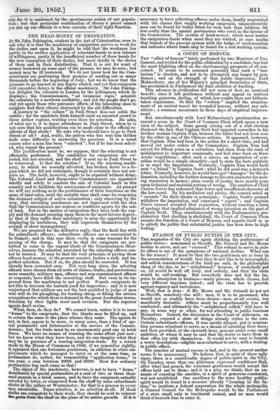A COURT OF HONOUR.
THEE " affair of honour " lately performed by two Members of Par- liament, and recited for the public edification by a candidate, has had the most blighting effect on the electioneering prospects of all con- cerned. It seems to be assumed generally that such a "bar- barism" is obsolete, and not to be attempted any longer by gen- tlemen ; and on the strength of that public impression, Lord Malmesbury, one of her Majesty's principal Secretaries of State, has proclaimed in Parliament the final abolition of duelling.
This advance in civilization did not seem at first an unmixed benefit ; since it left gentlemen without any appeal on matters touching generous feeling, of which law-courts have not hitherto taken cognizance. So that the "reform" implied the abandon- ment of an ancient resort for wounded honour, vithout any sub- stitute; a common occurrence in these days of empirical improve- ment.
But simultaneously with Lord Malmesbury's proclamation oc- curred a scene in the Court of Common Pleas which opens a nevr view of the subject. Some gossip arising out of a club election disclosed the fact that Captain Scott had imputed cowardice to his brother seaman Captain Nias, because the latter had not been seen by the other in one of the Chinese actions. It appeared, however, that Captain Nies had been in the action for a short time, and hail moved out under orders of the Commodore. Captain Nies had served for fifteen years as a volunteer, had risen from the rank of midshipman to important commands, and had since been on three Arctic expeditions : after such a career, an imputation of cow- ardice would be a. simple absurdity ; and io state the facts publicly is to repel the imputation. Formerly, Captain Nitta would have sent " a friend' to Captain Scott : what he did send was a lawyer's letter. Formerly, however, he would have got "damages " for the de- famation, including the further damage to his own character for seek- ing reparation in money; since courts of justice have mostly gone upon technical and material notions of wrong. The conduct of Chief justice Jervis has redeemed that lower and insufficient character of the law-court. By his mediation and advice, the counsel acted as " seconds for their clients or principals : Captain Scott's counsel withdrew the imputation, ona expressed " regret"; and Captain Nias's counsel accepted that reparation, without exacting a form of apology that implied admission of wrong intention on the part of Captain Scott. Thus, simultaneously with the Parliamentary pro- clamation that duelling is abolished, the Court of Common Pleas accepts the function of a Court of Honour, and acquits itself so as to satisfy the public that substantial justice has been done to high feeling.


























 Previous page
Previous page